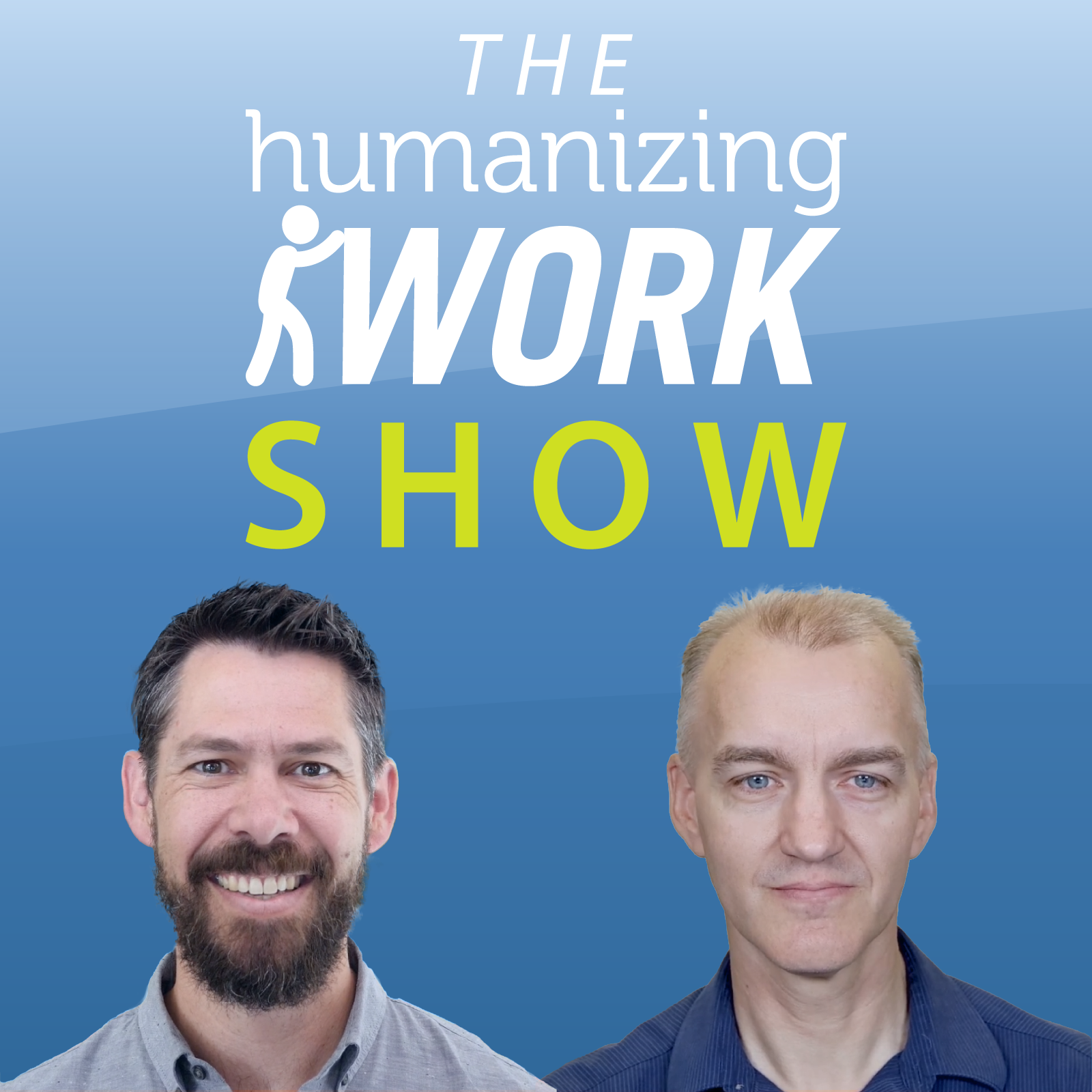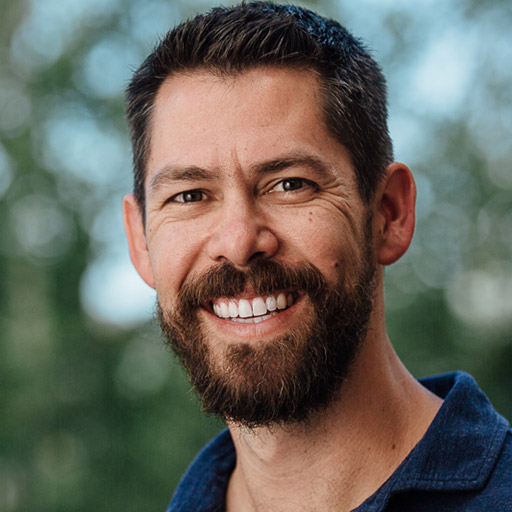Episode Transcript
Peter: Welcome to the Humanizing Work Show. I'm Peter Green here with Richard Lawrence, and today we want to talk to engineering managers, Scrum Masters, Product Owners, their bosses, really everybody that leads teams and groups and who feels stuck on a reporting treadmill. You give updates, you're tracking metrics, you build dashboards and fill out all those lovely status reports, but it never seems to be enough. If you're like me, you might feel like doing all of that work is a bit of a waste of time. I used to always feel like, look, I'm willing to invest my time to do all this just so everybody will leave my team alone and let us do the work.
Now, we're not anti metric. Sometimes we would use internal metrics for something we were working on. Sometimes it's a leading indicator of a, of an outcome we want to create in the future, but I would rarely share those kinds of metrics in things like dashboards and status reports, because I didn't want them to become permanently ingrained in that system.
Are we doomed to always do this? Is there any way to get off of this kind of reporting treadmill? That's our question for today's Humanizing Work Show.
Richard: I think the issue when it comes to metrics and status reports, when you're on that reporting treadmill, and there's always more and more to report on, the issue isn't really about metrics. It's about trust.
When leaders demand lots of reports, lots of updates, lots of numbers, it's a signal of low trust. It's a sign that they don't feel confident the team is going to deliver successfully, so they're asking for information that will make them feel more confident about it.
Peter: Which goes right in line with Rachel Botsman's definition of trust, which Richard, yeah, I think you remember. And uh, we talked about in episode 166, she defines trust as "a confident relationship with the unknown."
Richard: Right. So to change the reporting dynamic, you don't just polish the dashboard and get the numbers clearer, uh, vibe code, some new charts around it or something.
You earn trust by developing the traits of trustworthiness so that the people you want to trust you, have a more confident relationship with the unknown when it comes to you and your team. So Peter, what are those traits of trustworthiness?
Peter: Yeah, Botsman describes four of 'em. Two that are about how we work and two about why we work.
The two about how we work are competence and reliability. The two about why we work are integrity and empathy or care. Sometimes she uses empathy, sometimes she uses care to describe that trait. They mean the same thing, which we'll get into.
Competence is just having the skills, the time, the experience to do the thing you want to be trusted to do. Reliability is about having a good track record of being predictable. Do you do what you say you're gonna do? So those are the two how we work ones most teams focus primarily on those two.
On the why we work, we have integrity, which is about acting consistently with what we say we value. Do you walk the talk? And then care or empathy here is curiosity about what's important to the other person. If I don't care about you, if I don't care what's important to you, it's hard for you to trust me. So it's important for me to develop some empathy for what your experience is. What's your point of view?
Richard: Yeah. It occurs to me that you made that distinction between, uh, sort of how we work and why we work. A lot of the reporting that we see in organizations shows that we worked, we were busy, there was activity. And a lot of the metrics you can't really reason from them,whether a team is competent, reliable, doing what's important, doing things that matter to other people. They don't demonstrate those traits of trustworthiness, so it's not surprising that they don't actually produce a sense of trust.
Peter: Right.
So if we're gonna shift our reporting so that it's demonstrating those traits of trustworthiness, that's gonna be the key to making our reports more useful. It's important to remember though, that trust is not a blanket emotion. I don't trust you, Richard, to do anything in any context. I don't have a confident relationship with the unknown regarding some things.
Richard: That's really negative, peter, you don't trust me with anything?
Peter: Yeah. Uh, I trust you with so many things, Richard. I don't know that I would trust you to sink a free throw if our company's, uh, future were on the line.
Richard: That's, that's fair. Even though I'm six foot five, I'm terrible at basketball, so you should not trust my competence in that area.
Peter: So she points out that that trust is context specific. And so if you think about what you're gonna report on so that you can start to earn trust using those traits, the first thing to talk about is, what is the context that you're trying to earn trust in for your team? Why does the team exist? What value do do you produce?
And most of the people listening to this show probably have already captured that in some kind of an artifact, like a team purpose or vision statement, some kind of team charter. So you probably have an opinion about what kind of value you deliver and what you want to be competent in and deliver reliably.
Richard: But you also need to understand what matters to your stakeholders, to the people who are asking you for data about what's going on with your team. We talked about this way back in episode 77, They're All Customers, that a lot of the things that we use for customer research work really well for internal stakeholders of our team. So you can look at what are the jobs, pains, and gains that your stakeholders, your leaders have. What do they need to accomplish? What's frustrating? What outcomes would they like? And then how does your team fit into their success or get in their way? And you can craft how you share what your team is doing in a way that speaks to the things that they care about.
So ask what would they need to see that shows competence and reliability in terms that matter to them, that show that we're doing the things we ought to be doing and we're doing those reliably. Ask how you can make actual value visible earlier and more often. How you can frame your team's work in terms that your stakeholders care about.
Peter: Mm. It occurs to me, Richard, that we've sort of been describing this as a communication problem so far. Like you're probably delivering all this stuff. You're probably already have those traits of trustworthiness as much as you possibly can in your context, and you just need to communicate about it more clearly.
But that's not always the case. You may be struggling to deliver reliably. You may not have all the skills you need to feel competent in what your team's being asked to do, so you may need to work on that.
Richard: Right. That reminds me of a restaurant that my wife and I used to go to occasionally when we lived in the city. They were really good at marketing. They were occasionally really good at food and drink.
Peter: Only occasionally.
Richard: Yeah, I, we realized after a while that we couldn't trust them to reliably deliver a good date night dinner for us. But occasionally we'd see a, a picture on social media in their marketing and think, oh, that sounds really good. We should give them another chance.
And then there'd be a meal that wasn't worth it, and we'd be disappointed. No matter how good they were at their marketing, they weren't reliable and competent enough at the reason why we were going there. So they couldn't fix that with better communication. They needed to actually fix their operations.
Peter: Right. So to demonstrate trustworthiness you may need to change how you work and prove it in some way. That might mean taking a more complexity first approach, like we described in our CAPED model. Uh, using small sizes of value, limiting work in progress, all of the things that we talk about and teach teams and organizations to do are ways to improve your work.
And all of those are really focused on delivering value faster, sooner. Learning faster, sooner. That's what builds trust.
Richard: Hmm. So there's a, a sequence here of, of three big things. First, what do we want to be trusted to do? What's our purpose? What are we trying to achieve? What do we want our stakeholders to say?
Yeah, I can trust them with that. Number two, how can we make our current trustworthiness more visible? What are some ways that we can show really clearly how reliable, competent, high integrity, high care we are? And then three. Once you see it, you may want to ask, where might we need to change to become more trustworthy in those areas?
Peter: As you described those, I was ticking off examples in my past, Richard, where our teams that were successful did all of those things. And what I experienced is that once you start demonstrating that competence, that reliability, integrity, and care primarily by delivering value early and often, then trust goes up. And then suddenly the demands for status reports and metrics start to go away. They never go away completely, but they diminish significantly. And the more you deliver, the more free you are to focus on delivering.
Richard: Sometimes you're too close to this to see the path forward. You're in the middle of the systems of delivery and reporting, and there's inertia and things just are the way they are.
Whether you're the one caught in the middle, or you're the leader struggling to trust your teams. This is something we work on with a lot of our clients. If you visit humanizing work.com and scroll down a little bit, you can schedule a free consultation. With me and Peter, and we can talk about building systems that increase and maintain trust for better results in your context.
Peter: And if you get value from the show and you wanna support it. We really appreciate it. If you would do all the normal things on YouTube, which is subscribe like the episode, click the bell icon to get notified of new episodes. Drop us a comment with your favorite approach to earning trust. And if you're listening on the podcast, a five star review makes a big difference in whether other people who would benefit from the show find it or not.
Richard: Thanks for tuning in. We'll see you next time.




